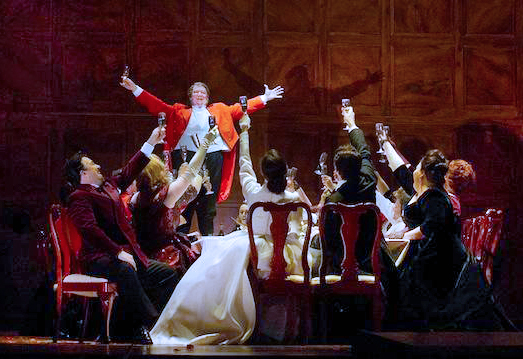Anyone who thinks opera is always about poor artists dying of tuberculosis in garrets should see the Met’s current production of Verdi’s “Falstaff.” This is the composer’s final opera and it is a comedy, though he remains most famous for his operatic tragedies.
The Met’s current production, directed by Robert Carsen and designed by Paul Steinberg, places the comic action in England in the 1950s – complete with costumes of the period, plus Scottish kilts, a gentlemen’s club and a Betty Crocker kitchen. Richard Farnes conducted this revival with a light touch, which clearly emphasized the airy lightness of Verdi’s music and its comedy.
Ambrogio Maestri owns the title role of Falstaff and the old and lecherous knight becomes consistently engaging and funny in Maestri’s capable hands. His basso voice fits the role perfectly and he has both the comic timing and the low notes for this part.
Ailyn Perez was consistently satisfying as Alice Ford, the Windsor housewife determined to outsmart the lecherous knight. Jennifer Johnson Cano’s Meg Page adds to the mellifluous comedy as the friend of Alice Ford – both plotting to outsmart the old knight.
Francesco Demuro sounded wonderful as Fenton, the young man in love with Nannetta, well sung by Golda Schultz. The young lovers repeat the famous Italian proverb “A mouth kissed loses nothing, but is reborn like the moon.” Mistress Quickly, sung by Marie-Nicole Lemieux, had all the low notes necessary as the woman who is always confronting and tempting the foolish knight. The final forest scene and fugue at the end of the opera summarizes Verdi’s theme in this work that all life is a joke and must not be taken too seriously.
The Met also revived Sonja Frisell’s impressive production of Verdi’s “Aida” this spring and it is always an audience favorite. This popular production is about forty years old, but still wows audiences, yet this year is the end of it. In two years the Met will be staging a new production of “Aida” and I will hate to see the gorgeous old production go.
For this revival, tenor Placido Domingo conducted with a capable hand; he is 75 years old now. The American soprano Sondra Radvanovsky sang the title role with impressive results. She has always been a bel canto specialist, but her voice is now larger and so she is moving into more dramatic soprano roles like Aida and singing them very well.
The new Spanish tenor Jorge De Leon also impressed as Radames, always audible and still sounding heroic at the end of this long opera. Quinn Kelsey sang Amonasro with a lovely baritone voice and he acted credibly as Aida’s vengeful father. Olesya Petrova’s Amneris was not as forceful and one wished for more power and drama from her. Stefan Kocan’s high priest Ramfis embodied the ominous presence of the clergy in ancient Egypt. Priests remain negative presences in most of Verdi’s operas, a reflection of his Risorgimento politics.
The Met’s spring season includes successful performances of both of Verdi’s best works and his long tradition of fabulous operas. In neither opera does anyone live in a garret or die of tuberculosis.





